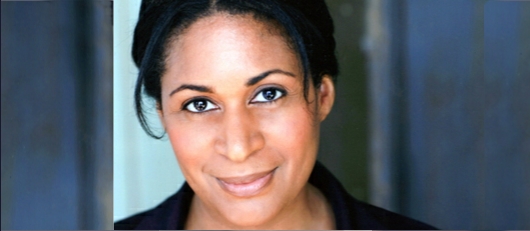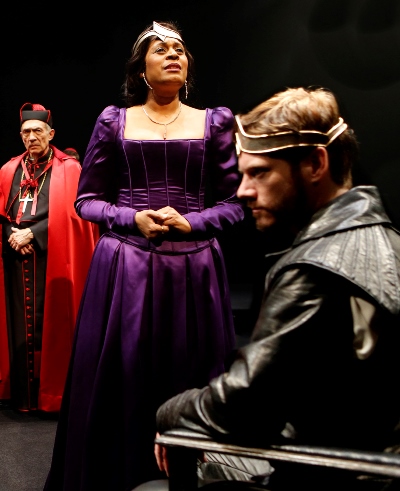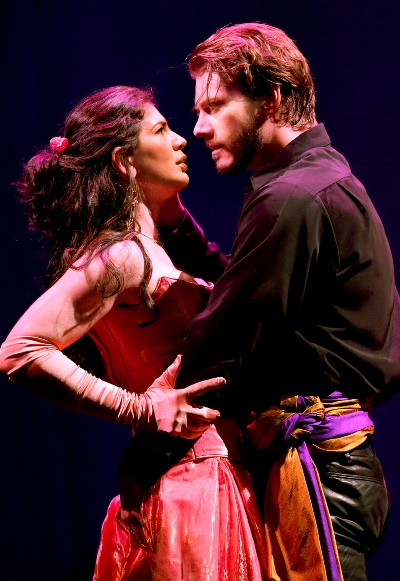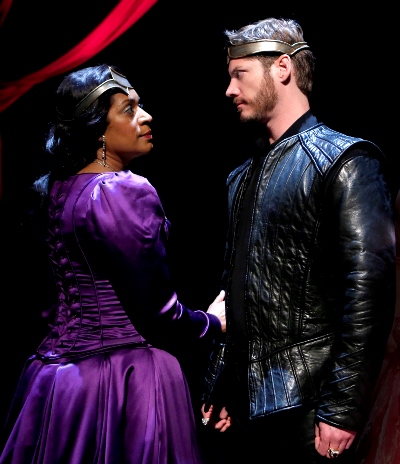Role Playing: Ora Jones had to find her way into Katherine’s frayed world in ‘Henry VIII’
 Interview: From doubting she had won the part, the actor has brought the Bard’s embattled queen to a fine pitch at Chicago Shakespeare Theater. Through June 16.
Interview: From doubting she had won the part, the actor has brought the Bard’s embattled queen to a fine pitch at Chicago Shakespeare Theater. Through June 16.
By Lawrence B. Johnson
Ora Jones, so assured and imposing as Queen Katherine in “Henry VIII” at Chicago Shakespeare Theater, was just as confident she had blown her audition for the part. And that wasn’t such a bad thing, she thought – because Katherine’s great speech in her trial scene, the very audition piece that Jones would come to deliver with authentic majesty, had left the actor essentially mystified.
 “That speech is brutal, a mine field, and I really didn’t understand it,” says Jones. “I left the audition thinking it would probably be just as well if I didn’t get the role. Then, when I got the call, my reaction was, ‘Oh, dear, now I have to do it.’”
“That speech is brutal, a mine field, and I really didn’t understand it,” says Jones. “I left the audition thinking it would probably be just as well if I didn’t get the role. Then, when I got the call, my reaction was, ‘Oh, dear, now I have to do it.’”
What’s so hard about Shakespeare’s trial monologue, says Jones, is rooted in the queen’s puzzlement over the third degree she’s getting in this public venue, and why her husband and mutually respectful partner of 20 years, Henry VIII, will scarcely acknowledge that she’s in the room, much less speak to her.
The king (Gregory Wooddell) has resolved that Katherine must be deposed as queen — divorced — so that he can remarry in hope of producing a male heir to the throne. He is abetted in this by Cardinal Wolsey (played by Scott Jaeck), who is seconded by an emissary from the pope, Cardinal Campeius (David Darlow). Katherine, astonished and humiliated by such treatment, wishes access to a lawyer from her native Spain, but is refused. The same cats now licking their chops, Wolsey and Campeius, will counsel this canary.
 “Katherine, who is not just the queen but the daughter of a king,” says Jones, “must ask her husband in this public place, ‘Why are you throwing me away, what have I done to offend you? If you can find anything against my honor, my bond of wedlock, my loved and duty…Am I treasonous?’ Her one big mistake is that she couldn’t come up with a surviving son as heir.”
“Katherine, who is not just the queen but the daughter of a king,” says Jones, “must ask her husband in this public place, ‘Why are you throwing me away, what have I done to offend you? If you can find anything against my honor, my bond of wedlock, my loved and duty…Am I treasonous?’ Her one big mistake is that she couldn’t come up with a surviving son as heir.”
But how to play it – demure, diffident, desperate?
“I could not be the dainty queen here,” says Jones, an Ohio native and Notre Dame graduate who has been working in Chicago theater since the 1980s. “The king wants a divorce, but for Katherine that is unthinkable. And besides, she loves him. She also feels entitled to speak for herself – and to remain in control. In rehearsal, Barbara Gaines (the director) was adamant about the fact that this was a public event, and to break down, to allow yourself to be destroyed in public, would be unacceptable for a monarch.
“But Henry has found another woman (Anne Boleyn) and he means to make her queen. He must get this formidable woman out of the way. The trial becomes a battle and she means to win it to keep her marriage together. She’s upset and angry, and she believes she’s in the right. You can’t move her off that.
 “Henry’s only words to her actually follow her, after she has stormed out, to everyone’s amazement. He says simply, ‘Go thy ways, Kate,’ just to save face. She has trashed his trial.”
“Henry’s only words to her actually follow her, after she has stormed out, to everyone’s amazement. He says simply, ‘Go thy ways, Kate,’ just to save face. She has trashed his trial.”
Jones calls that defining scene a delicate balance for Katherine, between preserving her personal dignity and pushing back against the will of the king.
“As an American and a private citizen, I can’t imagine having to present myself under those circumstances,” she says. “So that wasn’t a way in for me. What worked was that Katherine loves this man. I know what love is. We know what it means to have love and to lose it, or to fight against rumors with everything you’ve got. To fight against machinations and all kinds of crap.
“What’s so brilliant about the trial scene is that Henry has to sit there and hear Katherine out. There’s nowhere he can run. And he doesn’t have any answers. This is all trumped up. So he’s left with nothing more than, ‘Go thy ways, Kate.’”
Though the queen wins that round, the game is far from over. Wolsey and Campeius pay a visit to Katherine in her chambers, where they answer her further rebuffs by applying pressure of the physical sort.
“What makes form interesting is when it breaks,” says Jones. “It’s not just that what they do to her is painful: It’s where we are now. Her terror is the sudden realization that she could actually lose her life. Her ladies are gone, she is alone. What’s heartbreaking to her is the awareness that her pillar of comfort, the Catholic Church, does not avail her at all. These two men are not going to let go of her physically, symbolically or any other way until she submits.”
This actor who feared she might have grabbed a tiger by the tail in taking on the role of Katherine has, through long rehearsal and many performances, melded into the queen’s skin. Jones says she never really knows from one night to the next where the play will take her.
 “Writers often talk about how the plot takes over from them. As an actor, you sometimes find a character getting away from you. For me, Katherine’s objectives change from day to day. There are days when she wants to be heard in ways I hadn’t quite expected. Much of that has to do with the audience. In a thrust theater, you’re looking right at them. You feel their vibe, and you react to that.
“Writers often talk about how the plot takes over from them. As an actor, you sometimes find a character getting away from you. For me, Katherine’s objectives change from day to day. There are days when she wants to be heard in ways I hadn’t quite expected. Much of that has to do with the audience. In a thrust theater, you’re looking right at them. You feel their vibe, and you react to that.
“I let Katherine off the leash to do whatever she wants to do. She loves Henry and will never give that up. She never stops fighting. She also has a strong relationship with her faith, versus her religion. Her faith is unshakable. There are days when I think I hear my mother, who is a staunch Catholic with a stubborn streak. Once she makes up her mind, that’s the end of it. If her faith is involved, you’re not going to win.”
One other thing was on Jones’ mind, another enveloping issue — that glorious purple gown Katherine wears.
“The purple dress isn’t heavy, but it is a lot of fabric,” she says. “In one performance I got my heel caught in it and nearly fell. There are times when it feels like the costume’s wearing you.
Related Link:
- Review of ‘Henry VIII’: Read it at ChicagoOntheAisle.com
More Role Playing interviews:
- Kareem Bandealy tapped roots, hit books for form warlord in ‘Blood and Gifts’
- Eva Barr explored two personas of Alzheimer’s victim to find center of ‘Alice’
- Darrell W. Cox sees theater’s core in closed-off teacher of ‘Burning Boy’
- Chaon Cross turned Court stage into a romper room finding answers in ‘Proof’
- Dion Johnstone turned outsider Antony to bloody purpose in ‘Julius Caesar’
- Noir films gave Justine Turner model for shadowy dame in ‘Dreadful Night’
- Anish Jethmalani plumbs agony of good man battling demons in ‘Bengal Tiger’
- Gary Perez channels his Harlem youth as quiet, unflinching Julio in ‘The Hat’
- Kamal Angelo Bolden sharpened dramatic combinations to play ‘The Opponent’
- In wheelchair, Jacqueline Grandt explores paralysis of neglect in ‘Broken Glass’
- James Ridge thrives in cold skin of Shakespeare’s smiling serpent, Richard III
- Stephen Ouimette brews an Irish tippler with a glassful of illusions in ‘Iceman’
- Ian Barford revels in the wiliness of an ambivalent rebel in Doctorow’s ‘March’
- Chuck Spencer flashes a badge of moral courage in Arthur Miller’s ‘The Price’
- Rebecca Finnegan finds lyrical heart of a lonely woman in ‘A Catered Affair’
- Bill Norris pulled the seedy bum in ‘The Caretaker” from a place within himself
- Diane D’Aquila creates a twice regal portrait as lover and monarch in ‘Elizabeth Rex’
- Dean Evans, in clown costume, enters the darkness of ‘Burning Bluebeard’
- Dan Waller wields a personal brush as uneasy genius of ‘Pitmen Painters’
- City boy Michael Stegall ropes wild cowboy in Raven Theatre’s ‘Bus Stop‘
- Brent Barrett is glad he joined ‘Follies’ as that womanizing, empty cad Ben
- Sadieh Rifai zips among seven characters in one-woman “Amish Project”
- Kirsten Fitzgerald inhabits sorrow, surfs the laughs in ‘Clybourne Park‘
- Janet Ulrich Brooks portrays a Russian arms negotiator in ‘A Walk in the Woods’
Tags: Chicago Shakespeare Theater, Christina Pumariega, David Darlow, Gregory Wooddell, Henry VIII, Scott Jaeck, William Shakespeare


No Comment »
6 Pingbacks »
[…] Ora Jones had to find her way into Katherine’s frayed world in ‘Henry VIII’ […]
[…] Ora Jones had to find her way into Katherine’s frayed world in ‘Henry VIII’ […]
[…] Ora Jones had to find her way into Katherine’s frayed world in ‘Henry VIII’ […]
[…] Ora Jones had to find her way into Katherine’s frayed world in ‘Henry VIII’ […]